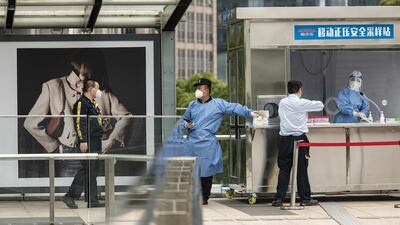Shanghai reported its lowest number of Covid-19 cases in three months as residents celebrated an end to mandatory home isolation for most of the city, while some companies cautiously continued factory restrictions.
China’s financial capital reported 15 new infections on Tuesday, the lowest number since March 2 and down from a peak of more than 27,000 a day in April.
While most of the city’s 25 million residents were released from one of the world’s most restrictive pandemic lockdowns after two months, about 10 per cent of them are still not allowed to move around the city.
As Shanghainese celebrated with fireworks and parties in their housing compounds, businesses appeared more circumspect after the lockdown inflicted a heavy toll on operations and production.
Tesla and Volkswagen will keep workers at their Shanghai plants isolated in special “bubbles” until the end of next week, to ensure stability of output, sources told Bloomberg News.
Japanese carmaker Toyota Motor said it will monitor the situation for now, as will Suzuki Motor.
Sony Group partially restarted its Shanghai plant that makes televisions and video cameras early last month, and intends to return to full operation over the next several months, its spokeswoman said.

Containment of the highly contagious Omicron variant of the coronavirus in Shanghai will be seen as vindication for China’s intensive zero-Covid strategy, which allows no tolerance, even as other countries live with the pathogen that triggered the most significant global health crisis in generations.
The victory took a hefty toll on the economy, with factories shut for weeks and supply chains upended as China went through the book of movement restrictions, mass testing and mandatory isolation of all coronavirus cases and their close contacts.
The Shanghai government issued a thank-you letter to its citizens on Tuesday, pledging to “spare no effort to promote the full restoration” of normal life and to “do our best to recover the time and losses caused by the epidemic”.
The letter, which took the No 8 trending spot on the Weibo microblogging app, received broad criticism online, with people saying it should have been an apology and calling for punishment of the experts who led the virus response.
While barriers erected to confine people to their apartment complexes are being dismantled, Shanghai’s residents will emerge to a city changed by the lockdown.
Vast makeshift hospitals were built to house the tens of thousands of infected and their close contacts. Many places remain off limits, with movie theatres, gyms and museums closed.
Seven & i Holdings Co, which has 150 7-Eleven convenience stores in Shanghai, has opened some shops but some may be affected by district-specific rules, its spokeswoman said.
People will still need a valid negative PCR test result before leaving home. Workers returning to the office were reminded to avoid meeting in rooms, practice social distancing in canteens and to disinfect their keyboards.
Most subway lines resume operations on Wednesday, although the minimum interval between trains will be as long as five to 10 minutes in the initial phase of reopening.
And with China committed to its zero-Covid policy, restrictions will be swiftly reimposed in the event of further virus flare-ups.
Regular testing is also set to become part of life. A network of tens of thousands of testing booths is being set up across the country’s largest and most economically vital cities, with the goal of having residents always a 15-minute walk away from a swabbing point.
The infrastructure will allow cities like Beijing, Shanghai, technology centre Shenzhen and e-commerce heartland Hangzhou to require tests as often as every 48 hours, with negative results needed to get on the subway or enter a store.
The testing plan shows the extent of China’s divergence from the world where Covid-19 infections are now commonplace.
The next iteration relies on taking faster action based on test results to prevent the virus from seeding within a community, as it did in Shanghai.

